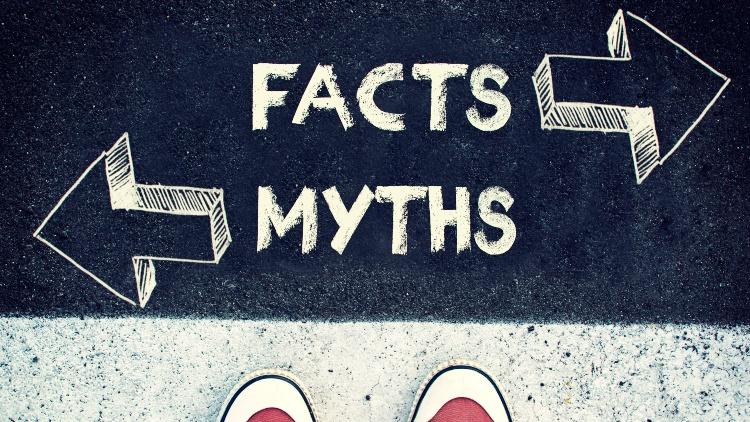
Weight Loss Myths, Debunked!
Introduction
The thing about weight loss is that the topic itself is shrouded in myths. Simply type in the term ‘weight loss’ and you’ll be inundated with tips, tricks and supposedly proven theories, all claiming to help you lose weight. So what weight loss myths are real and what myths about weight loss are fake? How can you tell?
In this article, we shall look into popular weight loss myths and facts, and see which can be debunked.
Myths about weight loss
You would think that myths are harmless. They are just theories after all. Yet even myths have the power to derail weight loss plans, if they are misinterpreted or believed to be true.
That is why it is important that you take the time to understand the facts behind each weight loss myth, so that you don’t let them impact on your weight loss endeavors.
For instance, many of your favorite weight loss myths conflict with factual information – info that you need to be aware of in order to lose weight. Talk about confusing!
Luckily, we are about to debunk many weight loss and nutrition myths so YOU can get down to the root of what are weight loss facts or myths:
Weight loss myth 1: Exercise isn’t important for weight loss
There is a common belief that if you exercise more, you will become hungrier. This in turn, will cause you to eat more and bump up your calorie intake, thus affecting your ability to lose weight.
THIS ISN’T TRUE.
Whilst studies have shown that those who exercise tend to eat more to help compensate for these increased activity levels; the amount they eat isn’t enough to surpass the amount they have burned off during exercise. This means, you can still achieve a negative energy balance and shift those excess pounds.
TIP: weight loss is not a solo effort. You need to exercise AND eat right in order to lose weight and keep it off.
Weight loss myth 2: Removing one food from your diet will help to make weight loss successful
Again THIS ISN’T TRUE (per se).
The problem with this particular weight loss myth is that it stems from the numerous fad diets out there which encourage you to cut food groups. Now, whilst you might lose some weight initially, long term this kind of diet will lead to weight gain as it is too restrictive and hard to follow. More worryingly, it can cause nutritional deficiencies as you’ll be depriving your body of essential nutrients which is unhealthy and dangerous.
TIP: NEVER cut whole food groups from your diet. Instead, aim to follow a balanced diet of protein, carbs and healthy fats, and remember that everything is okay in moderation.
Weight loss myth 3: Carbs will make you fat

One of the main reasons why low carb diets are so popular is the belief that carbs (especially simple carbs) are linked to weight gain.
THIS ISN’T TRUE.
Limiting the amount of carbs you eat can in fact increase your risk of developing nutritional deficiencies, as well as trigger dehydration, fatigue/low energy levels and the loss of other health benefits from these foods.
As with all foods, if you have carbs in moderation they won’t cause you to gain weight. If anything, you should ensure that you eat plenty of complex carbs – whole grains, starchy veg and fiber-rich foods e.g. fruit, veg. beans and legumes – as these are all great fuel sources which can help to elevate your energy; increase fat burn and ultimately, help you to lose weight.
The only thing you really need to be careful with – when it comes to carbs – is limiting the number of refined sugars that you have e.g. from chocolate, desserts, white bread and anything else that contains simple carbs.
Weight loss myth 4: Skipping meals will help you to lose weight
Once again this myth stems from the idea that if you consume fewer calories, you will create a big enough calorie deficit that will help you to lose weight. Now, whilst in theory, this is true, skipping meals WILL NOT help you to lose weight.
Why? Well, for starters you’ll feel hungrier, which will tempt you to snack or overeat during your next meal. Second, skipping breakfast has been linked to obesity (yes in more than one study).
If anything skipping meals will only serve to set your weight loss goals back. For that reason, ignore this myth and instead make sure that you eat healthily and make wise food choices (at mealtimes and with snacks).
Weight loss myth 5: Snacking causes weight gain and should not be done
Interestingly, whereas skipping meals can lead to weight gain (from overeating); snacking has the opposite effect and can actually help you to lose weight. Funny, right?
So whilst many dieters choose to starve themselves between meals – thinking they have to in order to lose weight – snacking can, in fact, help you to lose weight as you’ll eat less at your next meal. PLUS it will keep your metabolism high and your body fuelled e.g. for exercise, throughout the day. Similarly, it will stop you from binging in the evening, as you’ll still be full and satisfied from your meal.
The key of course is to snack wisely and make sure you only pick unprocessed, nutrient-dense foods to nibble on.
Weight loss myth 6: All calories are equal
Is it easy to see where the confusion arises from, as understanding how calories work is no easy business.
To put it simply: calories are a measurement of energy which all have the same energy content.
YET… this doesn’t mean all calorie sources will have the same effect on your weight loss. Far from it. Different foods go through different metabolic pathways, meaning they will each impact on your hunger (and the hormones that regulate your body) differently.
For instance, a protein calorie is not the same as a fat or carb calorie. So when structuring your diet, you need to be careful about what you eat and in what quantity.
A good example of this is replacing carbs and fats with protein. Protein can help to boost your metabolism whilst lowering your appetite. At the same time, it will optimize your weight regulating hormones.
Another good example of this are the calories found in whole foods (fruit) and refined foods (chocolate/sweets). Calories from whole foods tend to be more filling, making you less likely to snack. And when you snack less, you will consume fewer calories.
Weight loss myth 7: Losing weight is a linear process
The truth is – losing weight will not follow a straight path. There will be days and weeks where you lose weight easily and others where you gain a little.
THIS IS OKAY.
It is normal for your body weight to fluctuate up and down by a few pounds. So you shouldn’t worry if this happens, as it simply means you’re either carrying more food in your digestive system or you’re retaining a bit more water than normal.
Just remember: as long as your weight is generally going down, it is okay to have days where it fluctuates, as in the long term you’re losing weight.
Another thing to bear in mind is that everyone loses weight differently.
For instance, if you and your friend decided to lose weight together and ate the same foods; did the same amount of exercise and slept a similar amount; this doesn’t necessarily mean you’ll lose the same amount of weight. Why? Because there is more to weight loss than calories in and calories out. Due to differing metabolisms, hormones and muscle mass; the rate at which you each lose weight will be different.
Is this annoying? A little. But like we said – as long as the weight is coming off, you’re going a great job.
Weight loss myth 8: Obesity is about willpower, not biology
There is a common misconception that your weight is all down to willpower i.e. you wouldn’t be obese if you had the willpower to say no.
It is not as simple as that. Obesity is very complex and has got numerous contributing factors – genetic variables, hypothyroidism, PCOS, depression etc. – can increase your chances of putting on weight.
Then, of course, there are your hormones and the biological pathways meant to regulate your body weight. These are often found to be dysfunctional in those with obesity, making it a lot harder for them to lose weight and maintain it.
Take Leptin. Being resistant to this hormone can contribute to obesity, as its job is to tell your brain that you’ve got enough stored fat. And as you can guess – if you’re resistant to this hormone; your brain is going to think that you’re starving and will encourage you to eat more. How can you possibly exert the willpower to consciously eat less, when your own body believes it is at risk of starvation? You can’t – well not always.
Now, this doesn’t mean you should give up or admit defeat. You CAN still lose weight. It just may be harder for you to achieve it.
Weight loss myth 9: Fat makes you fat
True, there are more calories per gram in fat than there is compared to carbs or protein i.e. 9 calories per gram of fat, 4 calories per gram of carbs/protein. And yeah – it is quite common in junk food. HOWEVER, as long as your calorie intake remains within the healthy range, then consuming fat WON’T make you fat.
In fact, there are a number of high fat/low carb diets that have been found to encourage weight loss. Now, before you jump the gun – this doesn’t mean you can fill your diet with unhealthy, high-calorie junk foods that are full of bad fats – this WOULD make you put on weight.
However, if you tailor your diet to include a balance of healthy fats (all within your calorie count); then you can experience the highs of a fully functional body and successful weight loss.
REMEMBER: Fat alone will not cause weight gain. There are usually other contributing factors.
Weight loss myth 10: You MUST eat breakfast in order to lose weight
Whilst studies have found that people who skip breakfast do tend to weigh more than those who don’t; this doesn’t necessarily mean you MUST eat breakfast. What it indicates is that those who have breakfast usually uphold healthier eating habits.
This is further proven by one 4 month study on 309 adults. When breakfast habits were compared amongst the group, it was noted that their weight was not affected by the consumption/absence of breakfast. They remained the same.
Weight loss myth 11: Weight loss diets work
You’re probably thinking – why on earth would we say that this is a myth? Well, because it is true.
Dieting rarely works in the long-term, with up to 85% of dieters regaining the weight they’ve lost within 12 months.
Yet the problem lies with the word ‘diet’ itself. You see, instead of approaching weight loss with a ‘dieting mindset’, you should instead aim to change your lifestyle permanently with the goal of becoming fitter, healthier and happier.
By simply making changes to your level of physical activity, eating habits and amount of sleep; this combination can offer you weight loss as a natural side effect.
So the motto is: don’t diet, but make positive lifestyle changes.
Weight loss myth 12: Weight loss means fat loss
Many people view weight loss and fat loss as the same thing, but sadly this isn’t true.
Take the weight loss you experience in the beginning. Whilst your scales may have dropped, this doesn’t necessarily mean it is fat loss. Usually, it is just your body getting rid of any extra water from your tissues, joints and body cavities (water weight).
This is vastly different from losing body fat, as it has no link to the amount of calories you’ve consumed or burned.
Weight loss myth 13: You can target problem zones i.e. belly fat or your thighs
Here are the facts: whilst you can modify your eating habits and exercise levels to help you lose weight; you CANNOT control the exact place where this weight will come off.
Body fat is a prime example of this, as there is no controlling where you will shed fat – no matter what exercises or supplement providers may like to suggest. All they can do is offer you total body fat loss.
TIP: to help create a slimmer appearance, aim to tone the muscles in these areas instead.
Weight loss myth 14: Drastically cutting calories will cause rapid weight loss
Similar to skipping meals, dramatically cutting your calorie intake will just set you up for failure as 1) you’ll be ‘under-fuelling’ your body and 2) it will deprive you of essential nutrients.
In fact, this drop in calories could lead to muscle loss and falls in metabolism. That is why you should stick to a healthy calorie intake of 1200-1800 calories a day (depending on your nutritional needs). This will give your body plenty of fuel to function, as well as will help you to positively start losing weight (when combined with exercise).
Weight loss myth 15: You’ll gain all of this weight loss back
The saying is – the faster you lose weight, the quicker you’ll put it back on. But this isn’t always the case. True, water weight likes to make a reappearance and is easy to regain. However, weight loss doesn’t work this way.
For instance, some people are fortunate enough to lose weight fast and then keep it off by being consistent in their new eating habits/exercise levels.
And that is the point – as long as you stick to these lifestyle changes, it IS possible for you to keep the pounds at bay and stop them from returning.
Weight loss myth 16: Eliminating gluten from your diet will guarantee weight loss
Removing gluten from your diet may be good for your health – especially if you have celiac disease or struggle with hypothyroidism – however, cutting wheat from your diet won’t ensure weight loss.
Only by creating a negative energy balance can you truly lose weight.
Weight loss myth 17: Cheat days are okay
Don’t get us wrong – it is okay to slip up now and again. Hell, it is important to reward yourself. HOWEVER, dedicating entire days to binging – especially on the wrong foods – can stall your weight loss.
So instead of giving yourself the whole day off; stick to cheat meals or small treats. These won’t hinder your weight loss, but will instead help to minimize cravings.
Weight loss myth 18: Eating breakfast will boost your metabolism
Sadly, this isn’t the case, the same as eating at night being a ‘no-go’. Neither times will affect your ability to lose weight.
Conclusion
So is there any truth between weight loss facts and myths? Not really. A lot are based on inaccurate information or theories that hold no proof of being true. That is why we advise you to take myths about weight loss with a pinch of salt. After all, without proper information, you run the risk of making a mistake that could hinder your weight loss.
One fact about weight loss though that continues to be indisputable and true is that certain supplements CAN enhance your weight loss endeavors.
PhenQ for instance, can not only act as an assistive tool to your weight loss by increasing your fat burn and energy levels – as well as suppressing appetite – it also pairs beautifully with healthy lifestyle/ dietary changes to ensure that these weight losses last!




